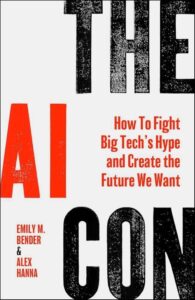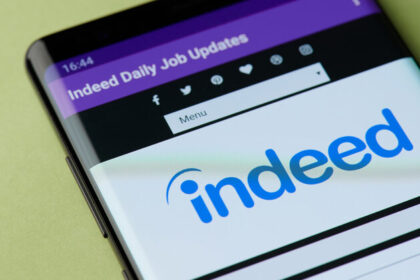Don’t call ChatGPT a chatbot. Call it a conversation simulator. Don’t think of DALL-E as a creator of artistic imagery. Instead, think of it as a synthetic media extruding machine. In fact, avoid thinking that what generative AI does is actually artificial intelligence.
That’s part of the prescription for countering the hype over artificial intelligence, from the authors of a new book titled “The AI Con.”
“‘Artificial intelligence’ is an inherently anthropomorphizing term,” Emily M. Bender, a linguistics professor at the University of Washington, explains in the latest episode of the Fiction Science podcast. “It sells the tech as more than it is — because instead of this being a system for, for example, automatically transcribing or automatically adjusting the sound levels in a recording, it’s ‘artificial intelligence,’ and so it might be able to do so much more.”
In their book and in the podcast, Bender and her co-author, Alex Hanna, point out the bugaboos of AI marketing. They argue that the benefits produced by AI are being played up, while the costs are being played down. And they say the biggest benefits go to the ventures that sell the software — or use AI as a justification for downgrading the status of human workers.
“AI is not going to take your job, but it will likely make your job shittier,” says Hanna, a sociologist who’s the director of research for the Distributed AI Research Institute. “That’s because there’s not many instances in which these tools are whole-cloth replacing work, but what they are ending up doing is … being imagined to replace a whole host of tasks that human workers are doing.”
Such claims are often used to justify laying off workers, and then to “rehire them back as gig workers or to find someone else in the supply chain who is doing that work instead,” Hanna says.
Tech executives typically insist that AI tools will lead to quantum leaps in productivity, but Hanna points to less optimistic projections from economists including MIT’s Daron Acemoglu, who won a share of last year’s Nobel Prize in economics. Acemoglu estimates the annual productivity gain due to AI at roughly 0.05% for the next 10 years.
What’s more, Acemoglu says AI may bring “negative social effects,” including a widening gap between capital and labor income. In “The AI Con,” Bender and Hanna lay out a litany of AI’s negative social and environmental effects — ranging from a drain on energy and water resources to the exploitation of workers who train AI models in countries like Kenya and the Philippines.

Another concern has to do with how literary and artistic works are pirated to train AI models. (Full disclosure: My own book, “The Case for Pluto,” is among the works that were used to train Meta’s Llama 3 AI model.) Also, there’s a well-known problem with large language models outputting information that may sound plausible but happens to be totally false. (Bender and Hanna avoid calling that “hallucination,” because that term implies the presence of perception.)
Then there are the issues surrounding algorithmic biases based on race or gender. Such issues raise red flags when AI models are used to decide who gets hired, who gets a jail sentence, or which areas should get more policing. This all gets covered in “The AI Con.”
It’s hard to find anything complimentary about AI in the book.
“You’re never going to hear me say there are things that are good about AI, and that’s not that I disagree with all of this automation,” Bender says. “It’s just that I don’t think AI is a thing. Certainly there are use cases for automation, including automating pattern recognition or pattern matching. … That is case by case, right?”
Among the questions to ask are: What’s being automated? How was the automation tool built? Whose labor went into building that tool, and were the laborers fairly compensated? How was the tool evaluated, and does that evaluation truly model the task that’s being automated?
Bender says generative AI applications fail her test.
“One of the close ones that I got to is, well, dialogue with non-player characters in video games,” Bender says. “You could have more vibrant dialogue if it could run the synthetic text extruding machine. And it’s fiction, so we’re not looking for facts. But we are looking for a certain kind of truth in fictional experiences. And that’s where the biases can really become a problem — because if you’ve got the NPCs being just total bigots, subtly or overtly, that’s a bad thing.”

Besides watching your words and asking questions about the systems that are being promoted, what should be done to hold the line on AI hype? Bender and Hanna say there’s room for new regulations aimed at ensuring transparency, disclosure, accountability — and the ability to set things straight, without delay, in the face of automated decisions. They say a strong regulatory framework for protecting personal data, such as the European Union’s General Data Protection Regulation, could help curb the excesses of data collection practices.
Hanna says collective bargaining provides another avenue to keep AI at bay in the workplace. “We’ve seen a number of organizations do this to great success, like the Writers Guild of America after their strike in 2023,” she says. “We’ve also seen this from National Nurses United. A lot of different organizations are having provisions in their contracts, which say that they have to be informed and can refuse to work with any synthetic media, and can decide where and when it is deployed in the writers’ room, if at all, and where it exists in their workplace.”
The authors advise internet users to rely on trusted sources rather than text extruding machines. And they say users should be willing to resort to “strategic refusal” — that is, to say “absolutely not” when tech companies ask them to provide data for, or make use of data from, AI blenderizers.
Bender says it also helps to make fun of the over-the-top claims made about AI — a strategy she and Hanna call “ridicule as praxis.”
“It helps you sort of get in the habit of being like, ‘No, I don’t have to accept your ridiculous claims,’” Bender says. “And it feels, I think, empowering to laugh at them.”
Links to further reading
During the podcast, and in my intro to the podcast, we referred to lots of news developments and supporting documents. Here’s a selection of web links relating to subjects that were mentioned.
- Ars Technica: Google DeepMind creates super-advanced AI that can invent new algorithms.
- GeekWire: AI startup led by UW computer science whiz enables ‘superhuman hearing capabilities’
- Journee-Mondiale: China’s first AI hospital can diagnose 10,000 patients in days (what this means for healthcare)
- Associated Press: Elon Musk’s AI company says Grok chatbot focus on South Africa’s racial politics was ‘unauthorized’
- 404 Media: Microsoft study finds AI makes human cognition ‘atrophied and unprepared’
- Politico: The worries about AI in Trump’s social media surveillance
- Reuters: Elon Musk’s DOGE is using AI to snoop on U.S. federal workers, sources say
- Ars Technica: Study of Danish labor market suggests that time saved by AI is offset by new work created
- “On the Dangers of Stochastic Parrots,” a research paper about large language models with Bender as lead author
- “The ‘Invisible’ Materiality of Information Technology,” a study focusing on the environmental impact of information technology
- “Can Machines Learn How to Behave,” an essay gauging the prospects for endowing AI agents with values, by Google researcher Blaise Aguera y Arcas
- “AI 2027,” an essay predicting that the impact of superhuman AI will be enormous, exceeding that of the Industrial Revolution
- Mystery AI Hype Theater 3000, a podcast about AI hype, co-hosted by Bender and Hanna
Bender and Hanna will be talking about “The AI Con” at 7 p.m. PT today at Elliott Bay Book Company in Seattle, and at 7 p.m. PT Tuesday at Third Place Books in Lake Forest Park. During the Seattle event, they’ll share the stage with Anna Lauren Hoffmann, an associate professor at the University of Washington who studies the ethics of information technologies. At Third Place Books, Bender and Hanna will be joined by Margaret Mitchell, a computer scientist at Hugging Face who focuses on machine learning and ethics-informed AI development.
My co-host for the Fiction Science podcast is Dominica Phetteplace, an award-winning writer who is a graduate of the Clarion West Writers Workshop and lives in San Francisco. To learn more about Phetteplace, visit her website, DominicaPhetteplace.com.
Fiction Science is included in FeedSpot’s 100 Best Sci-Fi Podcasts. Check out the original version of this report on Cosmic Log to get sci-fi reading recommendations from Bender and Hanna, and stay tuned for future episodes of the Fiction Science podcast via Apple, Spotify, Player.fm, Pocket Casts and Podchaser. If you like Fiction Science, please rate the podcast and subscribe to get alerts for future episodes.
Read the full article here










